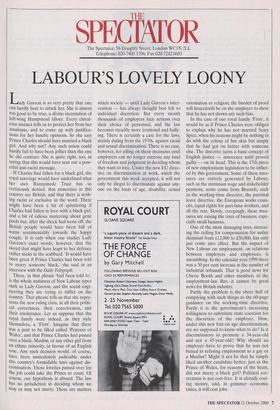The Spectator, 56 Doughty Street, London WC1N 2LL Telephone: 020-7405
1706; Fax 020-7242 0603
LABOUR'S LOVELY LOONY
Lady Gavron is so very pretty that one can hardly bear to attack her. She is almost too good to be true, a divine incarnation of left-wing Hampstead idiocy. Every chival- rous instinct tells us to protect her from her assailants, and to come up with justifica- tions for her lunatic opinions. So she says Prince Charles should have married a black girl. And why not? Any such union could hardly fail to have been jollier than the one he did contract. She is quite right, too, in saying that this would have sent out a pow- erful anti-racist message.
If Charles had fallen for a black girl, the royal marriage would have underlined what her own Runnymede Trust has so cretinously denied: that minorities in this country are British, and that there is noth- ing racist or exclusive in the word. There might have been a bit of spluttering if Charles had fallen in love with a black girl, and a bit of odious muttering about gene pools but, after the shock had worn off, the British people would have been full of warm sentimentality towards the happy couple. It is only when one studies Lady Gavron's exact words, however, that the sword that might have leapt to her defence rather sticks in the scabbard. 'It would have been great if Prince Charles had been told to marry someone black,' she said in an interview with the Daily Telegraph.
There, in that phrase tad been told to', is the whole nuttiness of New Labour types such as Lady Gavron, and the social engi- neering they are trying to inflict on the country. That phrase tells us that she repre- sents the new ruling class, in all their politi- cal correctness, their coerciveness, and their intolerance. Let us suppose that the royal family were indeed, as they style themselves, a 'Firm'. Imagine that there was a post to be filled called 'Princess of Wales', and that Prince Charles had passed over a black, Muslim, or any other girl from an ethnic minority, in favour of an English rose. Any such decision would, of course, have been immediately judiciable under this country's formidable laws against dis- crimination. Those lovelies passed over for the job could take the Prince to court. Of course, our hypothesis is absurd. The law has no jurisdiction in deciding whom we may or may not marry. These are matters which society — until Lady Gavron's inter- vention — has always thought best left to individual discretion. But every month thousands of employers face actions over their choice of personnel, and the law becomes steadily more irrational and bully- ing. There is certainly a case for the laws, mainly dating from the 1970s, against racial and sexual discrimination. There is no case, however, for piling on these measures until employers can no longer exercise any kind of freedom and judgment in deciding whom they want to hire. Under the new EU direc- tive on discrimination at work, which the government this week accepted, it will not only be illegal to discriminate against any- one on the basis of age, disability, sexual orientation or religion; the burden of proof will henceforth be on the employer to show that he has not shown any such bias.
In the case of our royal family 'Firm', it would be as if Prince Charles were obliged to explain why he has not married Scary Spice, when his reasons might be nothing to do with the colour of her skin but simply that he had got on better with someone else. The directive turns a basic concept of English justice — innocence until proved guilty — on its head. This is the 17th piece of new employment legislation to be inflict- ed by this government. Some of these mea- sures are entirely generated by Labour, such as the minimum wage and stakeholder pensions; some come from Brussels, such as the working-time directive, the parental leave directive, the European works coun- cils, equal rights for part-time workers, and all the rest. Slowly, creepingly, these mea- sures are raising the costs of business, espe- cially small business.
One of the most damaging laws, increas- ing the ceiling for compensation for unfair dismissal from £12,000 to £50,000, has only just come into effect. But the impact of New Labour on employment, on relations between employers and employees, is astonishing. In the calendar year 1999 there was a 30 per cent increase in the number of industrial tribunals. That is good news for Cherie Booth and other members of the employment-law Bar; it cannot be good news for British industry.
Partly the problem is the sheer hell of complying with such things as the 60-page guidance on the working-time directive. Partly it is the government's increasing willingness to substitute state coercion for the discretion of the employer. How, under this new ban on age discrimination, are we supposed to know what to do? Is it discriminatory to promote a 34-year-old and not a 45-year-old? Why should an employer have to prove that he was not biased in refusing employment to a gay or a Muslim? Might it not be that he simply liked another candidate better, just as the Prince of Wales, for reasons of the heart, did not marry a black girl? Political cor- rectness is not cost-free. It is already cost- ing money, and, in grimmer economic times, it will cost jobs.

























































































 Previous page
Previous page